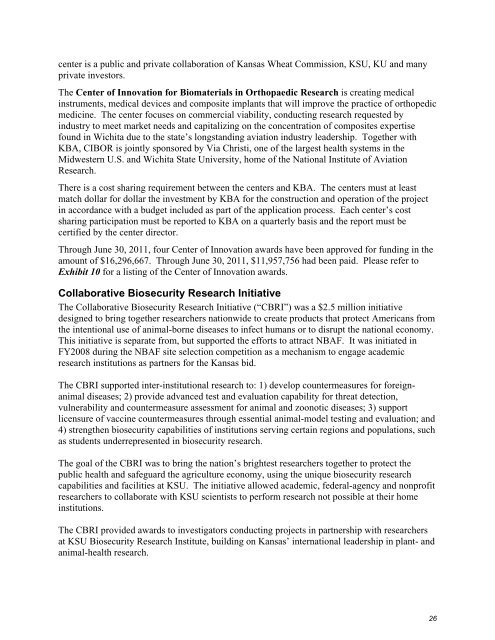Complete 2012 forensic audit documents - Kansas Bioscience ...
Complete 2012 forensic audit documents - Kansas Bioscience ...
Complete 2012 forensic audit documents - Kansas Bioscience ...
Create successful ePaper yourself
Turn your PDF publications into a flip-book with our unique Google optimized e-Paper software.
center is a public and private collaboration of <strong>Kansas</strong> Wheat Commission, KSU, KU and many<br />
private investors.<br />
The Center of Innovation for Biomaterials in Orthopaedic Research is creating medical<br />
instruments, medical devices and composite implants that will improve the practice of orthopedic<br />
medicine. The center focuses on commercial viability, conducting research requested by<br />
industry to meet market needs and capitalizing on the concentration of composites expertise<br />
found in Wichita due to the state’s longstanding aviation industry leadership. Together with<br />
KBA, CIBOR is jointly sponsored by Via Christi, one of the largest health systems in the<br />
Midwestern U.S. and Wichita State University, home of the National Institute of Aviation<br />
Research.<br />
There is a cost sharing requirement between the centers and KBA. The centers must at least<br />
match dollar for dollar the investment by KBA for the construction and operation of the project<br />
in accordance with a budget included as part of the application process. Each center’s cost<br />
sharing participation must be reported to KBA on a quarterly basis and the report must be<br />
certified by the center director.<br />
Through June 30, 2011, four Center of Innovation awards have been approved for funding in the<br />
amount of $16,296,667. Through June 30, 2011, $11,957,756 had been paid. Please refer to<br />
Exhibit 10 for a listing of the Center of Innovation awards.<br />
Collaborative Biosecurity Research Initiative<br />
The Collaborative Biosecurity Research Initiative (“CBRI”) was a $2.5 million initiative<br />
designed to bring together researchers nationwide to create products that protect Americans from<br />
the intentional use of animal-borne diseases to infect humans or to disrupt the national economy.<br />
This initiative is separate from, but supported the efforts to attract NBAF. It was initiated in<br />
FY2008 during the NBAF site selection competition as a mechanism to engage academic<br />
research institutions as partners for the <strong>Kansas</strong> bid.<br />
The CBRI supported inter-institutional research to: 1) develop countermeasures for foreignanimal<br />
diseases; 2) provide advanced test and evaluation capability for threat detection,<br />
vulnerability and countermeasure assessment for animal and zoonotic diseases; 3) support<br />
licensure of vaccine countermeasures through essential animal-model testing and evaluation; and<br />
4) strengthen biosecurity capabilities of institutions serving certain regions and populations, such<br />
as students underrepresented in biosecurity research.<br />
The goal of the CBRI was to bring the nation’s brightest researchers together to protect the<br />
public health and safeguard the agriculture economy, using the unique biosecurity research<br />
capabilities and facilities at KSU. The initiative allowed academic, federal-agency and nonprofit<br />
researchers to collaborate with KSU scientists to perform research not possible at their home<br />
institutions.<br />
The CBRI provided awards to investigators conducting projects in partnership with researchers<br />
at KSU Biosecurity Research Institute, building on <strong>Kansas</strong>’ international leadership in plant- and<br />
animal-health research.<br />
26


